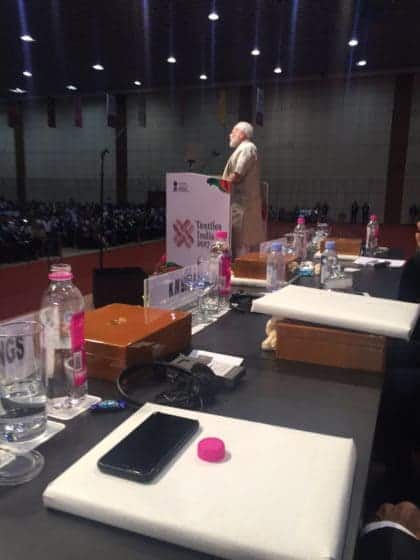Prime Minister Modi speaks at Textiles India 2017
Narendra Modi and UK India Business Council CEO Richard Heald share platform at Textiles India 2017

Friday saw Prime Minister Narendra Modi speak at Textiles India 2017 – a three-day global textile and handicrafts event at Mahatma Mandir in Gandhinagar, that also including UK India Business Council CEO Richard Heald as one of its speakers.
The event was attended by Union Textiles Minister Smriti Irani, Gujarat Governor O P Kohli, Gujarat CM Vijay Rupani, his Andhra Pradesh counterpart Chandrababu Naidu, MoS Ajay Tamta, textiles secretary Anant Kumar Singh and a number of business leaders from around the world.
Inaugurating the event, UK India Business Council CEO Richard Heald brought a little known fact to light. Producing a British £50 note from his pocket, he said: “This is a £50 note – worth some Rupees 4,000. The UK’s highest denomination note. It is not made of paper but 100% cotton. The note may be printed in the UK, but the cotton is sourced from India and embedded with 21st century visible and invisible security technology.”
He went on to highlight the potential for UK-India collaboration in the textiles industry, saying; “I want the UK and India to develop together new markets and new opportunities …. specifically by addressing together gaps in R & D, broadening the types of fabrics manufactured in India and developing new markets. This plays to “Make in India” – with major commercial benefits. And, it further empowers artisans and future-proofs sustainable employment throughout the Indian textile supply chain.”
Prime Minister Modi, on taking to the stage, highlighted the fact that India’s textile industry has been a key component of the country’s diverse cultural history, referencing 15th Century poet Kabir Das. “While attending the first ‘National Handloom Day’ event in Chennai two years ago, I met a weaver from Varanasi who gave me a stole… he may be present here today. It (the stole) had a popular couplet of Kabir Das handwoven” he said.
“Kabir himself used to weave cloth and dye it and was known to look for life’s truth through his work and expressed the same through his couplets. Clothing has close links to our cultural diversity and so many places and cities are well-known due to the textile industry they have. Be it silk from Kanchipuram, Varanasi and Assam or pashmina from Kashmir, muslin of Bengal, chikan work of Lucknow, handwoven ikkat work of Odisha and Telengana, Patan’s Patola from Gujarat or shawls from Kutch — from centuries these textile tradition have given an identity to these regions. You will never find this diversity in any other nation.”
Modi went on to describe India as “a bright spot” in the global economy which has become an attractive investment destination, before calling for more innovation and research in the textile sector and a plan that would boost “export textiles”.
“We should catalogue and map our clothing diversity and clearly earmark strengths and specialties of each state or region. Each state should appoint nodal officers dedicated to a few well-known products, who would facilitate producers and traders across the valuechain .Today, there is a demand for products with zero carbon footprint. Holistic lifestyle has become a buzzword. The market for organic dyes, clothes and fabrics made of organic products is growing. Our effort should be to innovate in organic products. I call upon you to come, invest and ‘Make Textiles in India’” he said.
Visit the Textiles India 2017 website here.



